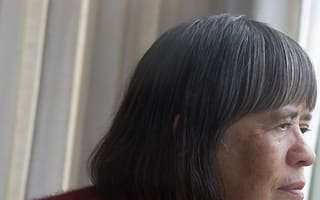An eight movement monodrama for mezzo-soprano and orchestra.

Gillian Whitehead Photo: Gareth Watkins / Lilburn Trust / Wallace Arts Trust
In 1909, Alice Adcock, a lively and adventurous young woman from Manchester, was on her way to New Zealand. She was 23, and had recently developed TB, for which there was then no cure. Somehow she persuaded her widowed father to let her travel alone to the other side of the world in case a healthy climate would save her life. (It worked - she lived for another 50 years). The family kept her entertaining letter describing shipboard life, and a few postcards from her have also survived, but most of what we know about her time in New Zealand comes from her father's letters to her, of which he kept copies, or from family tradition.
On her arrival in New Zealand, Alice went into service, travelling widely, much to the consternation of her father. As housekeeper (and the only woman) on a farm in Makarora (a remote settlement on Lake Wanaka) she became pregnant to an unknown man, but was 'rescued' by marriage to a local farmer, Charles Pipson, shortly before the birth of her daughter. In 1911, her beloved father died; in 1912, Alice and Charles had a son and the following year, pregnant again, Alice took her children back to England to visit her family. Tragically, while she was away, her husband died suddenly of typhoid fever. Alice hurried back to Makarora to claim her inheritance, but left the two babies with her brother Sam and his wife (who were shortly to emigrate to New Zealand) and took only her eldest child, the illegitimate one, with her. This outraged her sisters-in-law, who saw it as an insult to their dead brother; they sent her away from the farm empty-handed.
Once again she had to take a housekeeping job, this time in the North Island. In 1914, Alice and her brother's family met up again, and Alice began a new life. (Fleur Adcock - abridged)

Helen Medlyn Photo: supplied
"The music of 'Alice' is text-driven, ranging between a language at times extremely simple, as was the basic musical language of the settlers, and at times quite complex, evoking a storm at sea, or the unease of the settlers in a new environment, or Alice's reaction to the problems which beset her. The piece is held together by various referential motifs. The initial idea, which perhaps suggests the instability of the sea, is also present in the bell-like sounds marking Charles' death, music associated with a storm at sea is later associated with mental stress, while music suggestive of the movement of shipboard lice later underlies Alice's traumatic encounter with her sisters-in-law.
There are eight sections, which often merge into one another:
- 1. In a letter to her father, Alice describes shipboard life
- 2. In New Zealand, she compares her past life and hopes for the future
- 3. A dialogue between father and daughter, expressed through their letters
- 4. In Makarora, Alice discovers she is pregnant;
- 5. Alice hears of her father's death
- 6. In England, she learns of her husband's death
- 7. Back in Makarora, Alice is turned away by her sisters-in-law
- 8. Turning her back on the South Island, Alice looks forward to her new life with her brother's family in the north.
While writing this piece, I was drawn again and again into the thought that, although this is a true story, set in a particular place at a certain time, it has the resonances of a universal myth, known to all of us who live here. Our forebears, or we ourselves, have crossed the seas to begin a new life, with unforeseen and unimaginable difficulties and felicities, whether ten years, a century or a millennium or so ago." (Gillian Whitehead)
'Alice' was written as part of Gillian Whitehead's 2001 Residency with the Auckland Philharmonia Orchestra.
Recorded in 2003 by RNZ Concert

